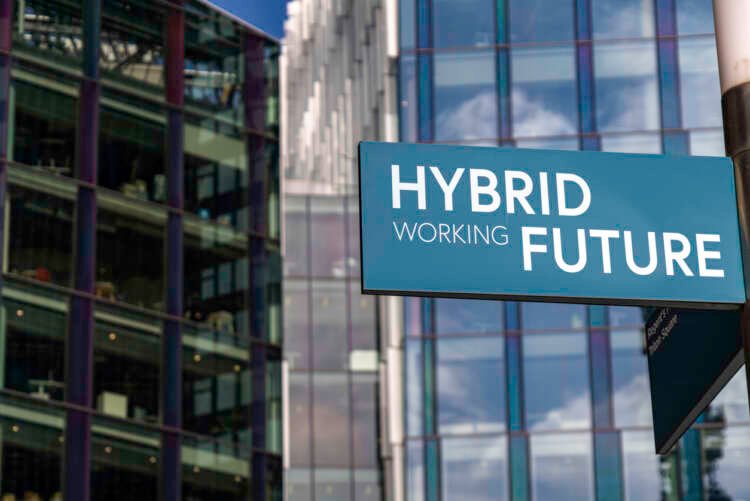Securing the hybrid future
Published by Jessica Weisman-Pitts
Posted on February 17, 2022
5 min readLast updated: January 20, 2026

Published by Jessica Weisman-Pitts
Posted on February 17, 2022
5 min readLast updated: January 20, 2026

By Glenn Griggs, Board Director, Ricoh UK
The past two years have been an incredible challenge for businesses worldwide. The way we live and work changed overnight, and suddenly agility and flexibility were the main drivers for resilience. There was a huge impact on employee mental health, and with the blurred boundaries of home and work, organisations found themselves having a much bigger role in their employees’ lives.
However, with every great challenge comes the opportunity for even greater innovation. The pandemic allowed us to share a new virtual workspace, forcing businesses to re-think the traditional models and their understanding of the office. While new technologies, processes, and habits developed, employees learnt to adapt to new ways of working. Remote and then hybrid workplace models eroded the traditional position of the office and enhanced conversations on wellbeing, digitalisation, and new dynamics that have the potential to increase productivity and efficiency rather than hinder it.
In particular, the second and third phases of the pandemic provided a catalytic moment to put into practice the hybrid working system, whose processes and opportunities have been discussed for many years. For businesses to fully reap the benefits of a hybrid workplace, many challenges still need to be addressed and solved, especially if hybrid working will become the industry standard for the future.
The Challenges
At Ricoh, we set out to really understand the challenges of our new hybrid world. To create a robust industry standard, all wrinkles must be smoothed out before implementing permanent plans. We undertook the ‘Leading Change at Work: Devising Your Digital Workplace Strategy’, gathering insights from IT, HR, Facilities Management, and Financial Operations professionals in the private and public sector.
The challenges, while at times specific, did also intersect across departments. They stemmed from the need to overcome fear and hesitancy when preparing a “return to the office” strategy, the urgent demand for metrics for business decisions, and even the hybrid working environment itself.
The need for more training
No one can deny that technology played a vital role in supporting our new way of working. Yet, the people we spoke to felt that greater investment in training is needed to ensure the technology is used properly and safely.
Data protection and cybersecurity are among the biggest risks facing businesses in 2022. The exponential growth in cloud investment and the implied necessary training helped raise awareness around cybersecurity and data protection, particularly for managers called to develop a safe and transparent policy. A possible solution could be to secure more resources to provide for better productivity and develop further investments.
The need for more tech training was, and still is, one of the key focuses for all departments. Its critical part in corporate conversations will only increase in the hybrid world. Training should be considered an ongoing process rather than a one-time session. Not only is this to reduce complacency and ensure employees are up to speed with the latest developments, but to make sure they are up to date as technologies evolve.
Metric driven business decisions
One of the key findings of our report was that all too often, businesses expect their Finance, HR and IT team to make decisions without any metrics.
To develop plans with any longevity, our interviewees urged CEOs to seek metrics that define what productivity and well-supported employees look like. Only with reliable metrics can they assess the right investments to make. By shaping these structures, departments can develop a robust strategy and potentially mitigate against any future challenges stemming from recent global events.
The word of the future: flexibility
There is now a greater demand and expectation from employees for employer flexibility. Employees compare the new world of work to the last two years rather than the years prior.
Their perception of ‘normal’ has shifted, and with a global talent shortage, businesses feel the strain to appease all employees. Flexibility comes hand in hand with collaboration, and in an increasingly globalised world, our offices are more connected and more affected by global crises than ever before.
Flexibility offers malleability and ensures managers can adapt to change and compromise when these issues occur. Organisations should remain flexible if they wish to remain competitive and attractive to top talent.
Ultimately, our world has been remodelled and rebuilt, and despite hesitancy from some, the hybrid office looks set to be the norm for most businesses. While it ensures continued flexibility and can support employees to work in a way that best suits them, we still need to take steps to guarantee its success in the long run.
The challenge is not impossible, and now is the time for leaders to work together to evaluate measurable baselines and trial and test new strategies to improve productivity and happiness. Working together and looking at the bigger picture will provide a holistic framework for future business relationships.
Explore more articles in the Business category











